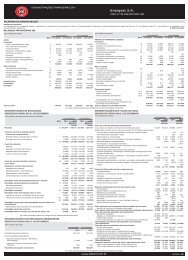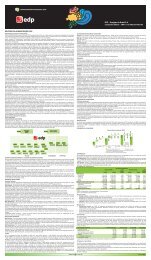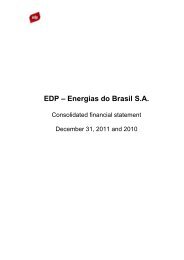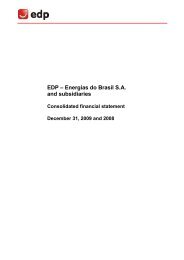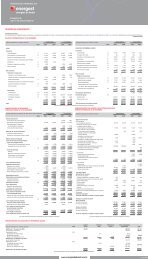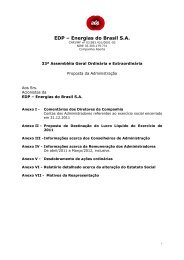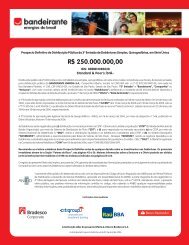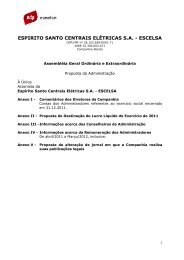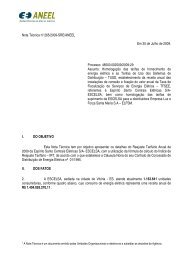19919510 COMMON SHARES EDP – Energias do Brasil SA
19919510 COMMON SHARES EDP – Energias do Brasil SA
19919510 COMMON SHARES EDP – Energias do Brasil SA
You also want an ePaper? Increase the reach of your titles
YUMPU automatically turns print PDFs into web optimized ePapers that Google loves.
Trading on Brazilian stock exchanges by non-residents of Brazil is subject to certain restrictions under<br />
the Brazilian foreign investment legislation. See “—Investment in Our Common Shares by Non-residents of<br />
Brazil.”<br />
Trading on the BM&FBOVESPA<br />
Trading on the BM&FBOVESPA may only be performed by authorized institutions. Trading sessions on<br />
the BM&BOVESPA are conducted each day from 10:00 a.m. to 5:00 p.m., or between 11:00 a.m. to 6:00 p.m.<br />
during daylight savings time in Brazil. The BM&BOVESPA also permits trading on an "after market" from<br />
5:45 p.m. to 7:00 p.m., or from 6:45 p.m. to 7:30 p.m. during daylight savings time in Brazil, on an overnight<br />
electronic trading system connected to traditional brokerage firms and brokerage firms operating on the<br />
Internet. Trading on the after-market is subject to regulatory limits on price volatility and on the volume of<br />
shares transacted through Internet brokers.<br />
When shareholders trade shares on the BM&FBOVESPA, the trade is settled in three business days after<br />
the trade date, and no adjustments for inflation are made. The seller is ordinarily required to deliver the shares<br />
to the exchange on the second business day following the trade date. Delivery of, and payment for, shares are<br />
made through facilities in the BM&FBOVESPA.<br />
In order to better control volatility, the BM&FBOVESPA a<strong>do</strong>pted a "circuit breaker" system pursuant to<br />
which trading sessions may be suspended for a period of 30 minutes or one hour whenever the indices of the<br />
BM&FBOVESPA fall below the limits of 10% or 15%, respectively, in relation to the index registered in the<br />
previous trading session.<br />
Investment in Our Common Shares by Non-residents of Brazil<br />
Foreign investors must register their investment in common shares under Law No. 4,131 or CMN<br />
Resolution No. 2,689 and CVM Instruction No. 325. CMN Resolution No. 2,689 affords favorable tax treatment<br />
to foreign investors who are not residents in a tax haven jurisdiction (i.e., countries that <strong>do</strong> not impose income<br />
tax or where the maximum income tax rate is lower than 20%), as defined by Brazilian tax laws.<br />
Under CMN Resolution No. 2,689, foreign investors may invest in almost all financial assets and engage<br />
in almost all transactions available in the Brazilian financial and capital markets, provided that certain<br />
requirements are met. In accordance with CMN Resolution No. 2,689, the definition of foreign investor<br />
includes individuals, companies, mutual funds and other collective investment entities <strong>do</strong>miciled or<br />
headquartered abroad. Under CMN Resolution No. 2,689, a foreign investor must: (i) appoint at least one<br />
representative in Brazil, with powers to perform actions relating to its investment; (ii) appoint an authorized<br />
custodian in Brazil for its investment, which must be a financial institution duly authorized by the Central<br />
Bank or the CVM; (iii) through its representative, register as a foreign investor with the CVM; and (iv)<br />
register its foreign investment with the Central Bank.<br />
In addition, an investor operating under the provisions of CMN Resolution No. 2,689 must be registered<br />
with the Brazilian internal revenue service pursuant to its Regulatory Instruction No. 200 of September 13,<br />
2002, as amended. This registration process is undertaken by the investor’s legal representative in Brazil.<br />
Securities and other financial assets held by non-Brazilian investors pursuant to CMN Resolution No. 2,689<br />
must be registered or maintained in deposit accounts or under the custody of an entity duly licensed by the<br />
Central Bank or the CVM. In addition, securities trading is restricted to transactions carried out in the stock<br />
exchanges or through organized over-the-counter markets licensed by the CVM, except for transfers resulting<br />
from a corporate reorganization, or occurring upon the death of an investor by operation of law or will.<br />
On October 2010, the Brazilian government increased the Tax on Foreign Exchange Transactions, or<br />
IOF/Exchange Tax. The IOF/Exchange Tax is levied on foreign exchange transactions related to investments<br />
in the Brazilian securities market made by foreign investors, including acquisitions of common shares by<br />
foreign investors in] this offering. See “Taxation—Material Brazilian Tax Considerations.”<br />
30



